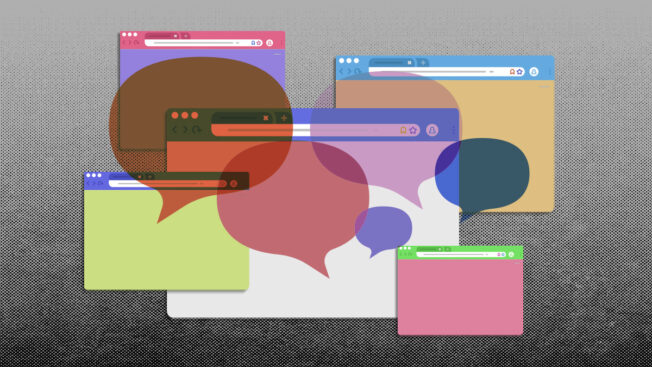Publishers Call Out Ad-Tech Firms’ Sale of Contextual Data as IP Theft
Publishers have long been wary of ad-tech firms undermining their profits through unnecessary fees and incorrect classification.
Of late, publishers have been frustrated by another ad-tech business model: the scraping of data from their websites, which ad-tech companies package into contextual segments that advertisers can use to target.
The practice is not new, but it is causing fresh consternation from publishers anxiously preparing for the deprecation of third-party cookies, which is slated for next year, four publishing industry sources told Adweek. And given the rapid rise of generative AI, publishers are on higher alert than ever to third parties scraping their content.
In lieu of cookies, publishers are investing in alternative signals like contextual data to monetize their audiences. As a result, publishers claim third-party ad-tech firms’ packaging and selling of this data as an intellectual property infringement. While it is tricky to quantify the exact impact on revenue, publishing sources voiced fears of buyers choosing ad-tech firm’s contextual segments, which tend to cover more of the open web, unlike publishers’ bespoke offerings, at a time when publisher’s revenue is already under threat from economic headwinds.
“There are hundreds of intermediaries who are classifying publisher intellectual property and then are taking it back to market as their own data and using it to compete for ad dollars against the publisher,” said Danny Spears, chief operating officer of Ozone, a publisher advertising platform for titled like The Guardian, Reach Plc. and The Telegraph.
Last week, the U.K. trade body the Association of Online Publishers wrote an open letter outlining the issue and “calling time on publisher IP theft” by content-verification firms for their sale of contextual audience segments built on publisher data. The organization, whose members include the BBC, Condé Nast Digital and The Guardian, called on ad buyers to hold ad-tech firms accountable.
Despite the emotive language and strong accusations, the acrimony so far between publishers and content-verification firms has mostly amounted to a war of words. Publishers, facing layoffs and softening ad revenue, are spread too thin to rise to this particular challenge. Plus, their leverage with ad-tech firms to stop a practice that has been going on for years is limited.
“They have bigger fish to fry,” said Jana Meron, founder of ad-tech consultancy Lioness Strategies and former svp of programmatic and data strategy at Insider, adding that the issue is still significant. “The cookie is dying and the publishers’ most valuable asset is being taken advantage of by ad-verification companies.”
Old practice, new practitioners
Contextual scraping is raising publishers’ ire partly because the practice has only recently been deployed by content-verification firms. Some publishers had viewed these companies, which originated to help block invalid traffic and protect brand safety, as friends rather than foes.
“[Content-verification firms] bring you business and then you find out [they’ve] scraped your pages and are setting up a competitive angle into your business and undermining your efforts to stand up your own data,” said Scott Messer, a media consultant and former executive at The Leaf Group.
Two of the largest content-verification firms, Integral Ad Science and DoubleVerify, rolled out contextual targeting products called Context Control and Custom Contextual Solution, respectively, both in 2020. IAS revealed in its earnings call last month that 47% of its programmatic revenue in 2022 came from the tool, up from 38% in 2021.
The content-verification companies’ tools help brands find optimal contextual categories, such as auto enthusiasts, to place their ads, leveraging the same technology that crawls webpages to determine whether they carry brand safety risks. But such technologies do not ask publishers’ permission and may categorize their content inaccurately, the AOP alleges in its letter.
Publishers cannot easily disable content-verification firms’ web crawlers from their sites, as the brand safety checks they provide are considered table stakes in programmatic advertising.
Adweek has learned that the AOP has set up meetings with IAS on behalf of its members to ask if it would be possible to uncouple the contextual targeting function from its web crawler. Publishers were unsettled when IAS said the product was engineered in such a way that it couldn’t be unbundled, per a source familiar with the matter. More recently, IAS said it would look into whether it could re-engineer the product to allow for unbundling, but it was unlikely.
IAS and DV did not respond to requests for comment.
Whose context?
Not all would define ad-tech-sold contextual targeting as intellectual property theft. IAS and DV say their solutions are a way for publishers to earn more money.
After offering its contextual targeting tool for advertisers, DV rolled out a separate contextual targeting solution marketed toward publishers in 2021, with a press release touting the solution’s potential to raise CPMs, decrease data costs and increase scale. IAS has said on its earnings calls that its Context Control product results in higher CPMs.
Larger publishers who have invested in developing and selling contextual targeting units have more to lose if buyers begin to favor the scale inherent in these firms’ contextual solutions.
A media buyer source said that direct deals with large publishers are always the first choice, but solutions like those offered by IAS and DV have a place for buying context at scale across the open web.
Smaller publishers, by contrast, might benefit from working with a third-party ad-tech firm for their contextual targeting, Spears said, but the parameters of the relationship need to be contractually regulated.
Whether ad-tech-led contextual targeting is a net positive for small publishers, some may feel they don’t have the knowledge or choice to take a stand against it.
“Am I going to lose money because the advertiser on the other end [say]s we only spend money on the Integrated Ad Sciences’ [tool]?” said Brian Warner, founder of site CelebrityNetWorth.com.
https://www.adweek.com/programmatic/publishers-call-out-ad-tech-firms-sale-of-contextual-data-as-ip-theft/


